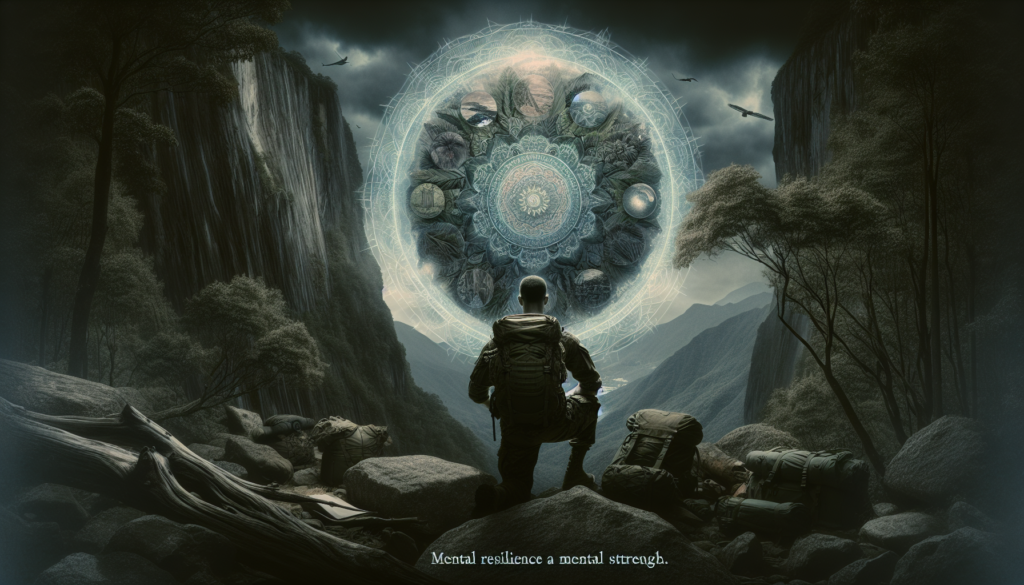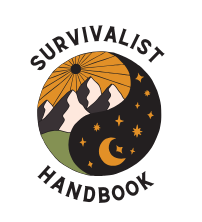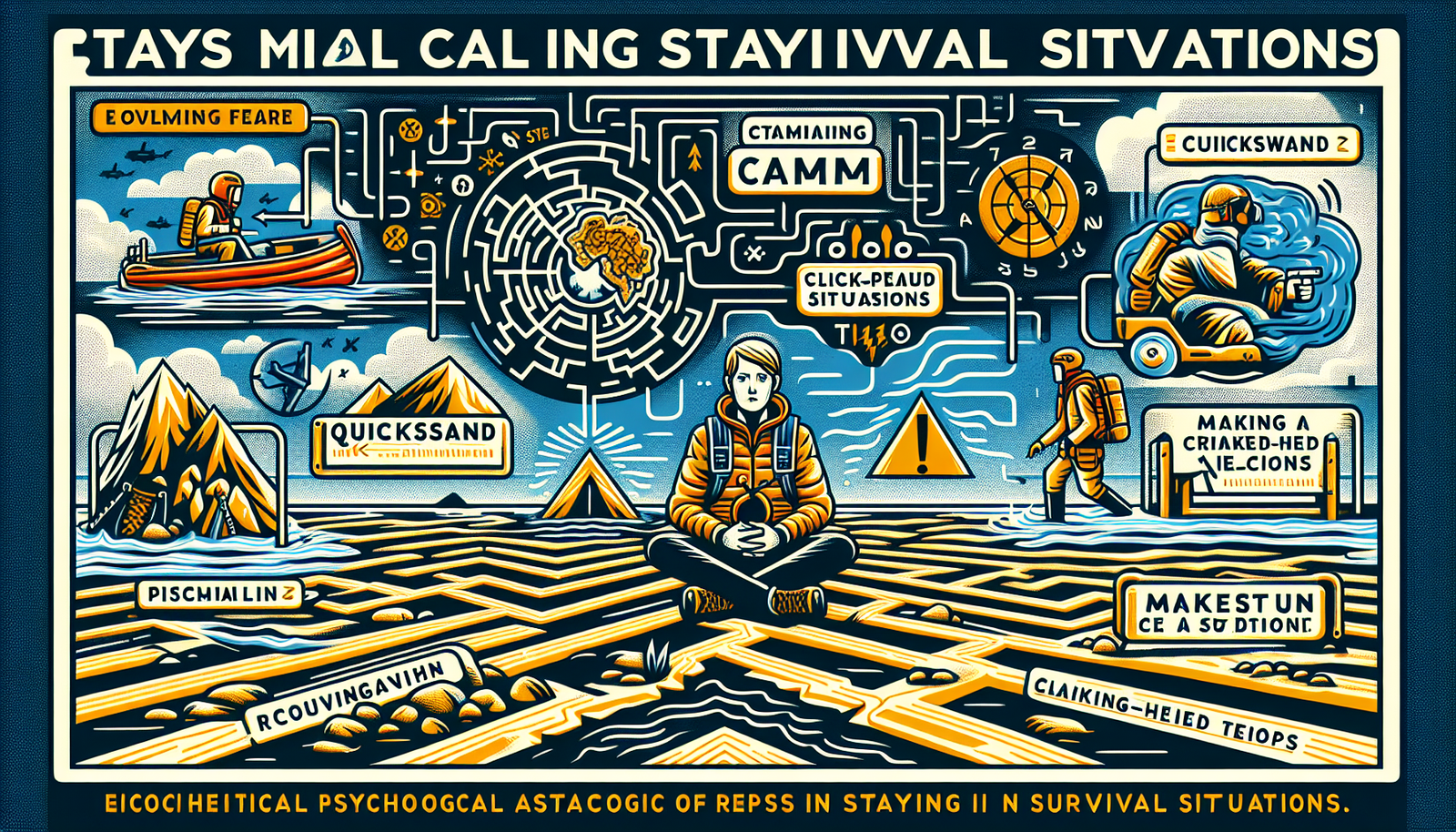In a world full of unexpected situations, it’s essential to have the knowledge and skills to handle survival scenarios with calm and positivity. Whether you find yourself in the wilderness, facing urban disasters, or encountering life-threatening situations, staying calm is key. With an array of practical psychological tips, this article equips you with the tools to navigate high-pressure situations, helping you maintain a clear mindset and make sound decisions. By exploring these tips, you’ll not only gain the ability to overcome challenges but also emerge stronger, prepared to face life’s unpredictable twists. So, whether you’re a curious beginner or an adventurous soul, these insights will empower you to become self-reliant and resilient in the face of adversity.
Understand the Importance of Mental Resilience

Recognize the impact of mental state on survival
When it comes to survival situations, your mental state can greatly impact your chances of making it through. It’s important to understand that your mindset can either work for you or against you. If you allow fear, panic, and negativity to take over, it can cloud your judgment and hinder your ability to think clearly. On the other hand, if you maintain a calm and positive mindset, you are better able to assess the situation, make rational decisions, and take appropriate actions.
Understand the benefits of staying calm and positive
Staying calm and positive in a survival situation can have numerous benefits. Firstly, it helps to reduce stress and anxiety, allowing you to think more clearly and make better decisions. Secondly, a positive mindset can help to boost your overall morale, giving you the motivation and strength to keep going even when faced with difficult challenges. Additionally, staying calm and positive can also have a positive influence on those around you, helping to create a sense of unity and teamwork which can be crucial in a survival scenario.
Manage Fear and Panic
Acknowledge fear as a natural response
When faced with a survival situation, fear is a natural response. It’s important to acknowledge and accept this fear, rather than trying to suppress it. By acknowledging your fear, you can address it head-on and take steps to manage it effectively.
Assess the situation objectively
In order to manage fear and panic effectively, it’s important to assess the situation objectively. Take a step back and try to view the situation from a rational perspective. Evaluate the risks and potential dangers, as well as your available resources and options. This objective assessment will help you to make more informed decisions and take appropriate actions.
Practice controlled breathing techniques
One effective way to manage fear and panic is by practicing controlled breathing techniques. When you feel yourself becoming overwhelmed or anxious, take slow, deep breaths. Focus on inhaling deeply through your nose, and then exhaling slowly through your mouth. This simple practice can help to calm your nervous system, reduce stress, and bring you back to a state of calm.
Focus on the present moment
When fear and panic start to take hold, it’s easy to let your mind wander to worst-case scenarios and future uncertainties. However, in a survival situation, it’s important to stay grounded in the present moment. Focus on the tasks at hand, and take things one step at a time. By directing your attention to the present moment, you can prevent overwhelming thoughts and maintain a calm and clear mindset.
Utilize Positive Self-Talk
Recognize negative thoughts and reframe them
Negative thoughts can quickly spiral out of control in a survival situation, leading to feelings of hopelessness and despair. It’s important to recognize these negative thoughts and actively reframe them into more positive and empowering statements. For example, instead of thinking “I’m never going to make it,” reframe it as “I will find a way to overcome this challenge.”
Use affirmations to boost confidence
Affirmations are powerful statements that can help to boost your confidence and shift your mindset in a positive direction. Choose affirmations that resonate with you and repeat them to yourself regularly. Some examples include “I am strong and capable,” “I have the skills necessary to survive,” and “I am resilient in the face of adversity.” By harnessing the power of positive affirmations, you can keep your spirits high and maintain a strong sense of self-belief.
Visualize successful outcomes
Visualization is a powerful tool that can help to enhance mental resilience. Take a few moments each day to visualize yourself overcoming obstacles and successfully navigating the survival situation. Imagine yourself staying calm, making intelligent decisions, and ultimately achieving a positive outcome. This visualization practice can help to reinforce a positive mindset and instill a sense of confidence and hope.
Establish a Routine and Sense of Normalcy
Create a daily schedule
In survival situations, it’s common for routines to be disrupted and a sense of normalcy to be lost. However, establishing a daily schedule can help to bring structure and stability to your life. Create a schedule that includes tasks such as gathering food and water, building shelter, and maintaining hygiene. Having a routine to follow can provide a sense of purpose and direction, and help to maintain a sense of normalcy amidst chaotic circumstances.
Engage in familiar activities
When everything around you feels unfamiliar and uncertain, engaging in familiar activities can provide a sense of comfort and familiarity. Whether it’s reading a book, practicing a hobby, or participating in a physical exercise routine, find activities that bring you joy and make you feel like yourself. These familiar activities not only provide a distraction from the stress of the situation, but also serve as a reminder of your own resilience and ability to find moments of normalcy even in challenging times.
Find comfort in small rituals
Small rituals can help to provide a sense of comfort and stability in survival situations. Whether it’s lighting a candle each night, taking a few moments for quiet reflection, or performing a daily gratitude practice, these rituals can help you to stay grounded and find solace amidst difficult circumstances. They serve as a reminder that even in the most challenging times, there are still moments of beauty and peace to be found.
Develop Problem-Solving Skills
Stay rational and analytical
In survival situations, it’s important to remain rational and analytical in order to effectively problem-solve. Avoid allowing emotions to cloud your judgment, and instead, approach problems with a calm and logical mindset. This will enable you to think critically and find practical solutions to the challenges you face.
Break the problem down into smaller tasks
When faced with a complex problem, it can be overwhelming to try and tackle it all at once. Instead, break the problem down into smaller, more manageable tasks. This not only makes the problem seem less daunting, but also allows you to focus on one step at a time, increasing your chances of finding a solution.
Evaluate available resources
In a survival situation, your available resources are key to your survival. Take stock of what you have at your disposal, whether it’s food, water, tools, or other supplies. Assess the condition and quantity of these resources, and determine how best to utilize them to meet your needs. By evaluating your available resources, you can make informed decisions and maximize your chances of survival.
Brainstorm creative solutions
Sometimes a survival situation requires thinking outside the box and coming up with creative solutions. Use your imagination and brainstorm alternative ways to solve problems or meet your needs. This could involve repurposing items, utilizing natural resources, or finding innovative ways to navigate obstacles. Embracing a creative problem-solving mindset can open up new possibilities and increase your chances of overcoming challenges.
Practice Mindfulness and Meditation
Focus on the present moment
Mindfulness involves directing your attention to the present moment, without judgment or attachment to thoughts or emotions. In a survival situation, practicing mindfulness can help to calm your mind, reduce stress, and restore a sense of balance. Focus on your surroundings, the sounds, smells, and sensations you are experiencing. By grounding yourself in the present moment, you can find a sense of calm and clarity, even amidst chaos.
Engage in deep breathing exercises
Deep breathing exercises are a simple yet powerful way to induce relaxation and reduce stress. Find a quiet moment to focus on your breath. Take slow, deep breaths, inhaling deeply through your nose and exhaling slowly through your mouth. As you breathe deeply, feel the tension release from your body and your mind become more peaceful. Deep breathing exercises can help to regulate your heart rate, lower blood pressure, and promote a state of calmness.

Use guided imagery to induce relaxation
Guided imagery involves using your imagination to create calming and peaceful visualizations. Find a quiet and comfortable space, close your eyes, and imagine yourself in a tranquil and safe environment. Picture the details of this scene – the colors, the sounds, the smells. Allow yourself to fully immerse in this visualization, and let the feelings of relaxation and peace wash over you. This guided imagery practice can help to reduce anxiety, promote relaxation, and restore a sense of calm.
Seek Social Support
Connect with others in a similar situation
In survival situations, it can be helpful to connect with others who are going through similar experiences. Seek out support groups, online forums, or local communities where you can share your thoughts, experiences, and emotions. Connecting with others who understand your situation can provide validation, comfort, and a sense of camaraderie. Together, you can offer each other support and encouragement in navigating the challenges of the survival scenario.
Share experiences and emotions
Survival situations can be emotionally taxing, and it’s important to express and process your emotions. Share your experiences and emotions with trusted friends, family members, or support groups. Talking about your feelings can help to relieve stress, gain perspective, and foster a sense of connection. By sharing your experiences and emotions, you can lighten the emotional burden and gain valuable insights and support from those around you.
Offer and accept help
In a survival situation, it’s important to both offer and accept help from others. Be willing to lend a helping hand to those in need, as this fosters a sense of community and cooperation. Likewise, be open to receiving help when it is offered. It’s okay to lean on others and accept support during challenging times. Remember, survival is often a team effort, and by working together, you can enhance your chances of making it through.
Maintain open communication
Maintaining open lines of communication with others is essential in a survival situation. Staying connected with your loved ones, support network, or fellow survivors can provide a sense of security and reassurance. Check in regularly, share updates on your situation, and offer support and encouragement to one another. By maintaining open communication, you can help to mitigate feelings of isolation and strengthen vital connections.
Use Visualization Techniques
Imagine a peaceful and safe place
Visualization techniques can be a powerful tool for finding moments of peace and tranquility in a survival situation. Close your eyes and imagine yourself in a peaceful and safe place. Picture the details of this place – the sights, sounds, and sensations. Allow yourself to fully immerse in this visualization and feel a sense of calm wash over you. By regularly practicing this visualization technique, you can cultivate a sense of inner peace, even amidst challenging circumstances.
Visualize successful problem-solving
Visualization can also be used to enhance problem-solving skills. Take a few moments each day to visualize yourself successfully overcoming obstacles and finding solutions to the challenges you face. Imagine yourself approaching problems with confidence, creativity, and resourcefulness. Visualize the steps you take and the positive outcomes you achieve. By regularly visualizing successful problem-solving, you can strengthen your problem-solving skills and increase your chances of finding effective solutions.
Picture a positive and hopeful future
In a survival situation, it’s easy to become consumed by the difficulties of the present moment. However, by picturing a positive and hopeful future, you can maintain a sense of optimism and resilience. Imagine yourself emerging from the survival situation stronger and wiser. Picture the opportunities and joy that await you once the situation is resolved. By visualizing a positive and hopeful future, you can keep your spirits high and maintain a sense of hope and motivation.
Engage in Physical Exercise
Release tension and stress through movement
Physical exercise is not only beneficial for your overall well-being but can also help to release tension and stress in a survival situation. Engage in activities such as stretching, walking, or practicing yoga to help loosen tight muscles and alleviate physical discomfort. By moving your body, you can increase blood flow, release endorphins, and promote a sense of relaxation and well-being.
Promote the release of endorphins
Endorphins are chemicals produced by the body that promote feelings of happiness and well-being. Engaging in physical exercise is a natural way to release endorphins and boost your mood. Aim to incorporate regular exercise into your daily routine, even if it’s just a short walk or a few minutes of stretching. By promoting the release of endorphins, you can elevate your mood and enhance your mental resilience in a survival situation.
Improve overall well-being
Physical exercise has numerous benefits for your overall well-being, both physically and mentally. It can help to improve your cardiovascular health, increase your strength and flexibility, and boost your immune system. Additionally, exercise is also known to reduce stress, anxiety, and symptoms of depression. By taking care of your physical health through regular exercise, you are better equipped to handle the challenges of a survival situation and maintain a positive mindset.
Accept and Adapt to Uncertainty
Embrace the unpredictability of the situation
In a survival situation, one thing is certain – uncertainty. It’s important to embrace and accept this unpredictability, rather than resisting or fighting against it. Understand that unexpected challenges and changes are likely to arise, and instead of becoming overwhelmed or discouraged, view them as opportunities for growth and learning. By embracing the unpredictability, you can adapt more effectively and navigate the situation with greater ease.
Focus on what is within your control
In any survival situation, there are certain things that are within your control and others that are not. Instead of fixating on the aspects that are beyond your control, focus on what you can do. Identify the actions and decisions that are within your power and direct your energy towards those. By focusing on what is within your control, you can maintain a sense of agency and actively work towards improving your circumstances.
Adapt to changes and make necessary adjustments
Survival situations require a great deal of adaptability and flexibility. As the situation evolves and changes, be willing to adjust your mindset, plans, and actions accordingly. Be open to new ideas and approaches, and be proactive in finding alternatives and solutions. Adaptability is a key trait in survival, as it allows you to respond effectively to the ever-changing circumstances and increase your chances of not just surviving, but thriving.
In conclusion, developing and maintaining mental resilience is crucial when facing survival situations. By recognizing the impact of your mental state, managing fear and panic effectively, utilizing positive self-talk, establishing a routine, developing problem-solving skills, practicing mindfulness, seeking social support, using visualization techniques, engaging in physical exercise, and accepting and adapting to uncertainty, you can enhance your ability to stay calm and positive in challenging circumstances. Remember, staying mentally resilient can not only increase your chances of survival, but also help you emerge stronger from any adversity. So, embrace these psychological tips and empower yourself to navigate any survival situation with resilience and strength.

